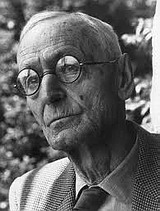"A modernist work of profound wisdom that continues to enthral readers with its subtle blend of Eastern mysticism and Western culture, the Penguin Modern Classics edition of Hermann Hesse's Steppenwolf is revised by Walter Sorell from the original translation by Basil Creighton. At first sight Harry Haller seems a respectable, educated man. In reality he is the Steppenwolf: wild, strange, alienated from society and repulsed by the modern age. But as he is drawn into a series of dreamlike and sometimes savage encounters - accompanied by, among others, Mozart, Goethe and the bewitching Hermione - the misanthropic Haller discovers a higher truth, and the possibility of happiness. This blistering portrayal of a man who feels himself to be half-human and half-wolf was the bible of the 1960s counterculture, capturing the mood of a disaffected generation, and remains a haunting story of estrangement and redemption. Herman Hesse (1877 - 1962) suffered from depression and weathered series of personal crises which led him to undergo psychoanalysis with J. B. Lang; a process which resulted in Demian (1919), a novel whose main character is torn between the orderliness of bourgeois existence and the turbulent and enticing world of sensual experience. This dichotomy is prominent in Hesse's subsequent novels, including Siddhartha (1922), Steppenwolf (1927), Narcissus and Goldmund (1930) and his magnum opus, The Glass Bead Game (1943). Hesse was awarded the Nobel Prize for Literature in 1946. If you enjoyed Steppenwolf, you might like Hesse's Siddhartha, also available in Penguin Classics. 'A savage indictment of bourgeois society ... the gripping and fascinating story of disease in a man's soul' The New York Times"

Hermann Hesse (Συγγραφέας)
Ο Herman Hesse γεννήθηκε το 1877 στο Galw, μια μικρή πόλη του Μέλανος Δρυμού. Στα γράμματα εμφανίστηκε το 1899 με την ποιητική συλλογή Τα ρομαντικά τραγούδια και τη συλλογή πεζών Μια ώρα μετά τα μεσάνυχτα. Ακολούθησαν πολυάριθμα έργα, που τον καθιέρωσαν ως έναν από τους δημοφιλέστερους συγγραφείς του 20ού αιώνα: "Πήτερ Κάμεντσιντ" (1904), "Κάτω από τον τροχό" (1906), "Γερτρούδη" (1910), "Ντέμιαν" (1914), "Σιντάρτα" (1927), "Ο λύκος της στέπας" (1927), "Νάρκισσος και Χρυσόστομος" (1930), "Ταξίδι στην Ανατολή" (1932) κ.ά. Υπήρξε ιδρυτής του περιοδικού Vinos Voco, μέλος της Πρωσικής Ακαδημίας, επίτιμος διδάκτορας του Πανεπιστημίου της Βέρνης και τιμήθηκε με πολλά βραβεία, μεταξύ των οποίων με το βραβείο Νόμπελ το 1946, και με το βραβείο Ειρήνης των Γερμανών βιβλιοπωλών το 1955. Πέθανε το 1962.
Δείτε όλα τα βιβλία του συγγραφέα
